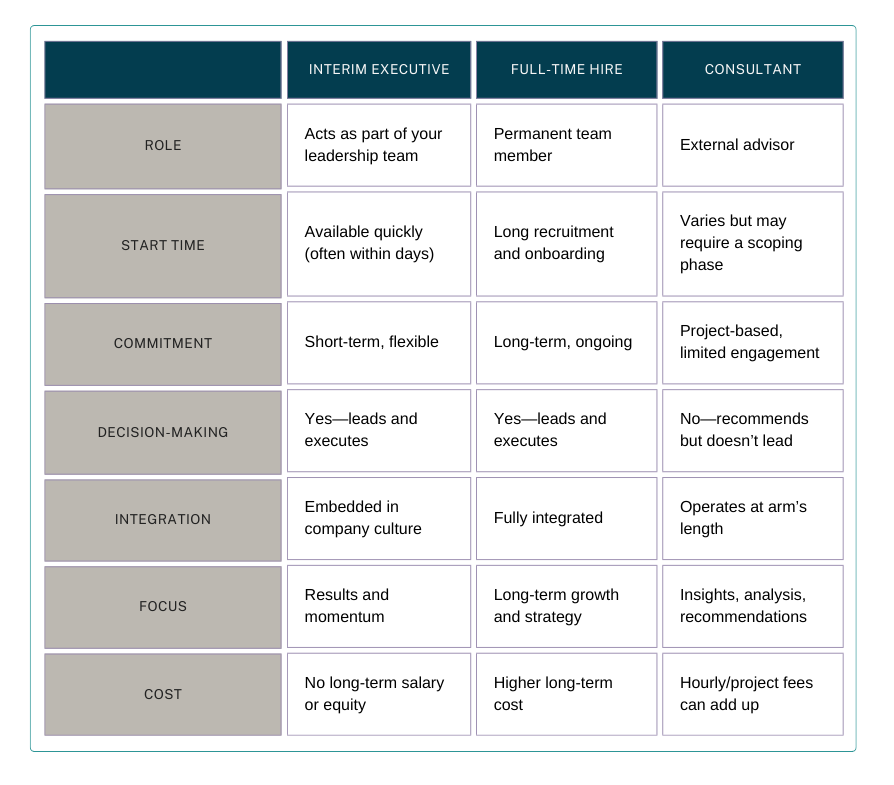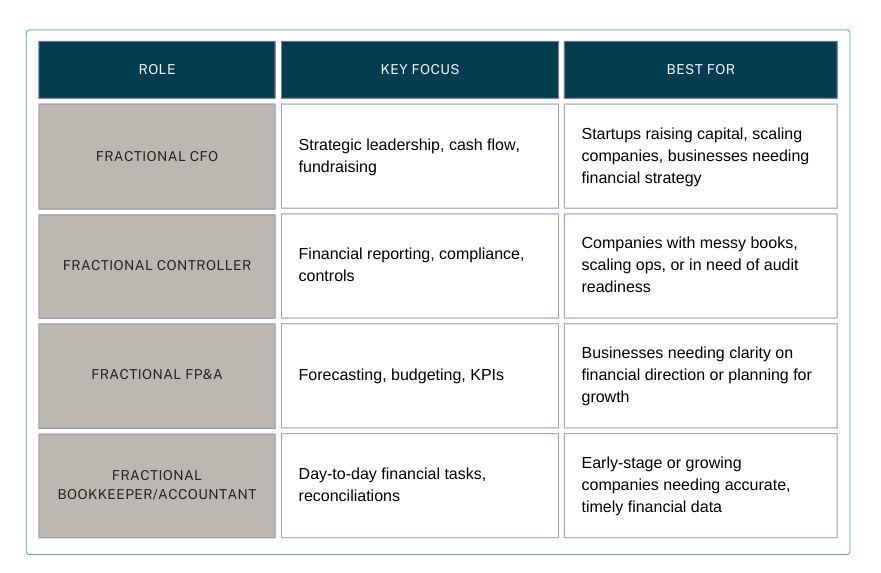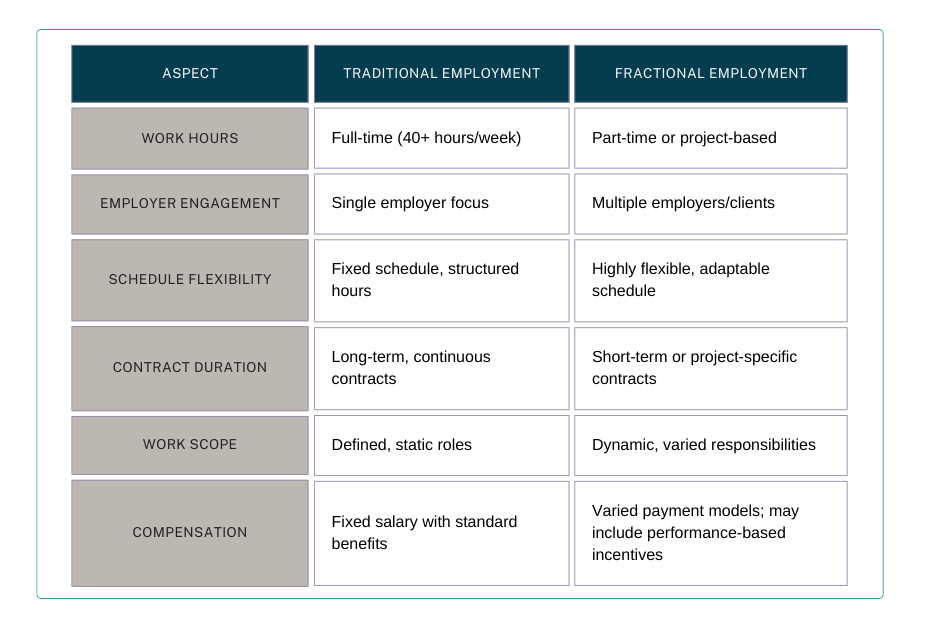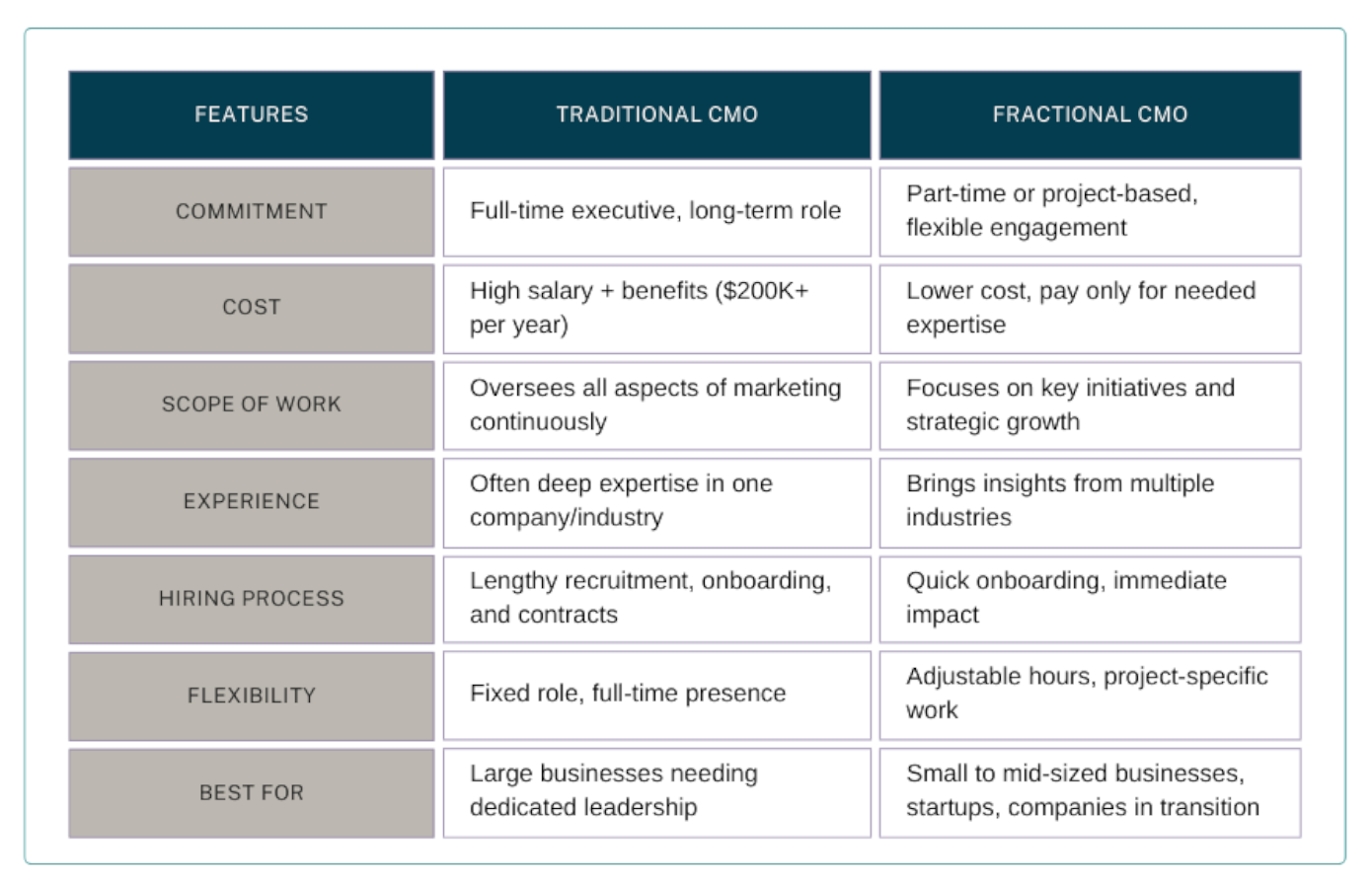Leadership gaps can be tough. Whether someone’s stepped away unexpectedly (or just suddenly) or your company is growing faster than your team can adapt to, one thing is clear: business does not take a pause. Projects still need to get done (and done well). Teams still need support. And strategy still requires focus, planning, and execution.
But hiring a full-time executive? That takes time—and a lot of time at that. Not to mention the cost and long-term commitment that comes with it. That’s where interim management comes in: it’s can be a flexible, fast, and effective solution to bring experienced leadership into your organization exactly when—and for as long—as you need it.
Let’s break down what interim management is, how it works, and why it might be the missing piece for your business right now.
What Is Interim Management?
Interim management is exactly what it sounds like: stepping in when there’s a leadership gap and keeping things moving until a long-term solution is in place. But it’s more than just a temporary fix.
An interim executive is a seasoned leader who joins your team for a defined period—weeks or months, not years—to take ownership of a specific role or challenge. They’re not consultants hovering on the sidelines. They’re embedded in your business to help make smart decisions, manage teams, and drive outcomes from day one.
Need someone to steady the ship while you search for a new COO? Or to lead a critical initiative that can’t wait? An interim leader can jump in, assess the situation quickly, and start delivering results—without the delays of a traditional hiring process.
To put it in perspective, here’s how interim leaders differ from other common options.
How Interim Leaders Compare
 When Does Interim Management Make Sense?
When Does Interim Management Make Sense?
Every business hits moments where the need for leadership outpaces the ability to hire. Maybe a key executive just left. Maybe you’re scaling faster than your internal team can manage. Or maybe you’re staring down a high-stakes initiative with no one to confidently lead the charge. That’s where interim management shines.
Here are some of the most common (and critical) times companies turn to interim leaders:
- An open seat is slowing things down: Whether it’s your COO, CFO, or Head of Operations, leadership roles don’t stay empty for long without consequences. An interim leader can step in to help stabilize the team and keep key priorities on track.
- You’re scaling—and fast: Growth is great, but it also comes with growing pains. Interim executives bring experience in building processes, managing rapid change, and helping teams scale smart, not just fast.
- You’re in transition: Mergers, acquisitions, pivots, restructures—whatever the shift, interim leaders bring a calm, steady hand to guide your company through uncertain terrain.
- You need specific expertise right now: Sometimes it’s not about a gap—it’s about a mission. Interim execs can help lead time-sensitive projects, launch new products, or help you enter new markets with confidence and speed.
The common thread? These are all moments where waiting for the “perfect hire” may not be an option.
The Benefits of Interim Management
Again, interim management isn’t just a stopgap—it’s a smart, strategic move. When you bring in the right interim leader, you’re not only filling a gap—you’re adding value from day one.
Here’s how your business benefits:
- Speed without compromise: Interim leaders are available now. No long interview loops. No drawn-out negotiations. Just proven experience, ready to go when you are.
- Expertise you don’t have to train: These are seasoned professionals who’ve seen it all—from early-stage chaos to enterprise-level operations. They know how to hit the ground running, assess what’s working (and what’s not), and make meaningful changes fast.
- Objective perspective: Interim leaders aren’t tangled in company politics or legacy thinking. They bring fresh eyes and honest feedback—especially valuable during times of change or growth.
- Focused on outcomes, not longevity: They’re here to lead, execute, and deliver results—not to climb the internal ladder. That kind of focus often brings clarity and momentum where it’s needed most.
- Flexible and cost-effective: You get top-tier leadership without the long-term salary, equity, or benefits package. And when the job is done, there’s no messy offboarding or reorganization needed.
At its best, interim management gives you exactly what you need: leadership that moves the needle, without slowing you down.
Is Interim Management Right for You?
You don’t need to be in crisis to benefit from interim leadership. In fact, many companies turn to interim executives during moments of momentum—when things are going well, but the internal structure hasn’t quite caught up yet. Maybe your operations feel stretched. Maybe your team is stalling out without a clear leader. Or maybe you’re holding off on a big move because you don’t yet have the right person to lead it.
If any of that sounds familiar, interim management could be exactly what you need.
It’s not about filling a seat just to say it’s filled. It’s about placing someone at the helm who can guide your business through a key chapter—whether that means building systems for growth, driving an urgent initiative, or simply keeping the team steady during a time of change.
It’s a solution designed to meet you where you are and help you get where you want to go—without delay, drama, or a long-term commitment you’re not ready for.
Avoid Long-Lasting Leadership Gaps
At Next Fractional, we understand how disruptive leadership gaps can be—and how much potential is lost when key roles sit empty. That’s why we specialize in matching growing companies with interim executives who don’t just show up… they step up.
We’ve built a network of proven leaders across functions and industries, each ready to jump in and make an immediate impact. Whether you need someone to stabilize operations, manage change, or lead a new initiative, we’ll help you find the right fit—fast.
Our process is straightforward, responsive, and tailored to your needs. No drawn-out searches. No overpromising. Just real leadership, delivered when you need it most.
If you’re facing a leadership gap—or feeling like your growth is outpacing your current team—we’d love to hear what’s going on. Connect with us today to explore whether interim management is the right next step for your business.



 Benefits of Fractional Finance Management
Benefits of Fractional Finance Management
 Anatomy of a Fractional Contract
Anatomy of a Fractional Contract






